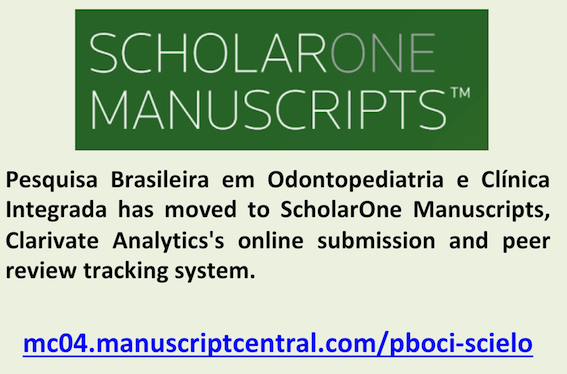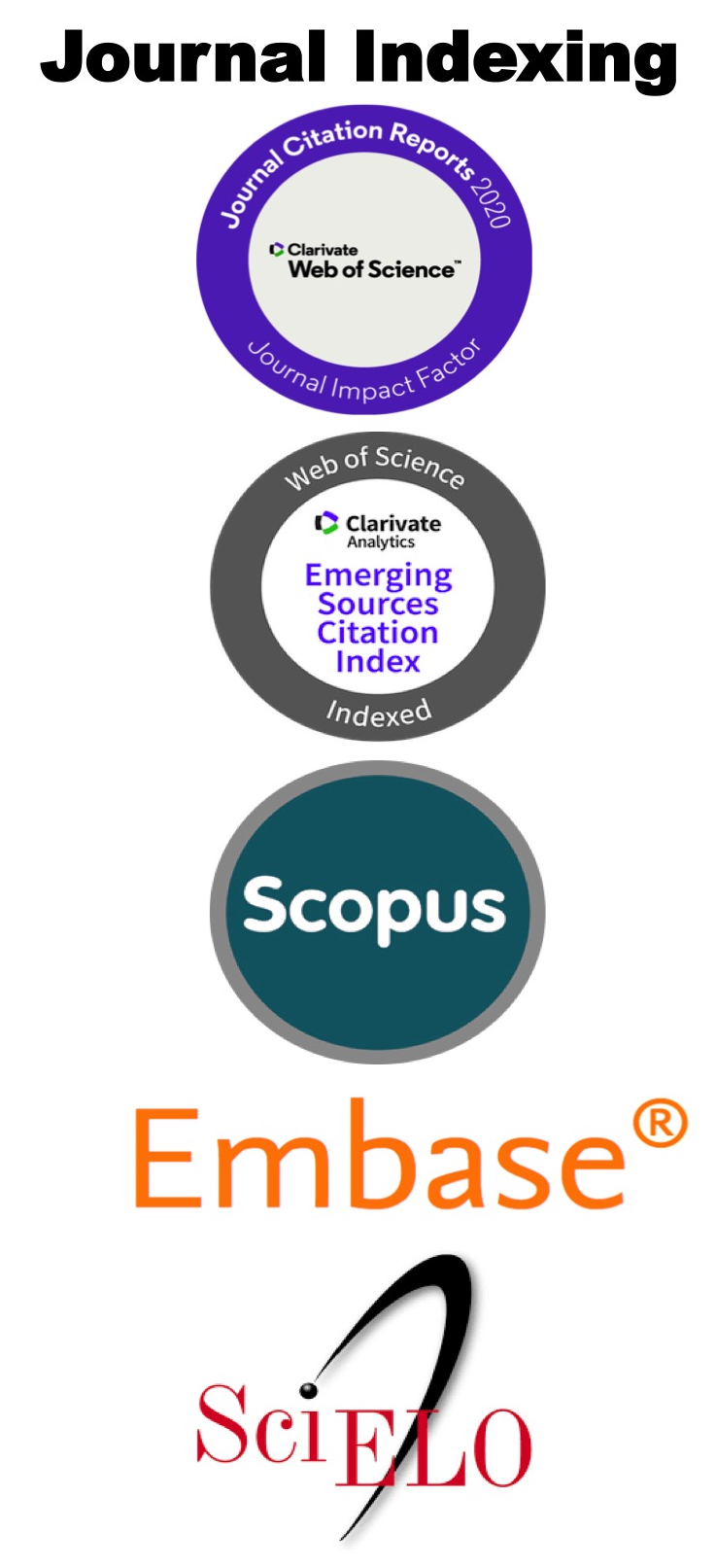
https://mc04.manuscriptcentral.com/pboci-scielo

The PESQUISA BRASILEIRA EM ODONTOPEDIATRIA E CLINICA INTEGRADA operates under a continuous publication online modality. This model results in annual volumes, without issue numbers.
The main goal of the PESQUISA BRASILEIRA EM ODONTOPEDIATRIA E CLINICA INTEGRADA is to publish results from Original Research as well as Systematic Reviews in the fields of Dentistry and related sciences areas. Its abbreviated title is Pesqui. Bras. Odontopediatria Clin. Integr., and it should be used in bibliographies, footnotes, references and bibliographic strips.
PESQUISA BRASILEIRA EM ODONTOPEDIATRIA E CLINICA INTEGRADA encourages submissions from all authors throughout the world.
Manuscripts are judged by two experts solely on the basis of their contribution of original data and ideas and their presentation. All manuscripts must comply with Instruction to Authors.
The following articles will be considered for publication: Editorials, Original Articles, Systematic Reviews, Scope Reviews, Short communications and Letters to the Editor.
SUBMITTED MANUSCRIPTS MUST NOT HAVE BEEN PUBLISHED, ACCEPTED FOR PUBLICATION OR BE UNDER CONSIDERATION ELSEWHERE.
All articles will be critically reviewed by the editor and invited referees within 4 months.
PESQUISA BRASILEIRA EM ODONTOPEDIATRIA E CLINICA INTEGRADA endorses the PRISMA statement for the reporting of systematic reviews and meta-analyses, clinical trials (CONSORT), the STROBE statement for the reporting of epidemiological studies, case reports (CARE), accuracy studies on diagnostic tests (STARD) and the RECORD statement for the reporting of studies conducted using observational routinely-collected health data. The Journal recommends that all articles submitted must comply with the editorial quality standards established in the Uniform Requirements for Manuscripts Submitted to Biomedical Journals (available at www.icmje.org). Authors should check the EQUATOR Network for reporting instructions and further information.
On submission, editors review all submitted manuscripts initially for suitability for formal review. Manuscripts with insufficient originality, serious scientific or technical flaws, or lack of a significant message are rejected before proceeding for formal peer-review.
All articles will be critically reviewed by the Editor and invited referees within 4 months.
The reviewers should not be affiliated with the same institutes as the contributor/s.
Every manuscript is also assigned to a member of the editorial team, who based on the comments from the reviewers takes a final decision on the manuscript. The comments and suggestions (acceptance/ rejection/ amendments in manuscript) received from reviewers are conveyed to the corresponding author.
If required, the author is requested to provide a point by point response to reviewers’ comments and submit a revised version of the manuscript. This process is repeated till reviewers and editors are satisfied with the manuscript.
All authors of must disclose any and all conflicts of interest they may have with publication of the manuscript or an institution or product that is mentioned in the manuscript and/or is important to the outcome of the study presented. Authors should also disclose conflict of interest with products that compete with those mentioned in their manuscript.
Manuscripts accepted for publication are copy edited for grammar, punctuation, print style, and format. Page proofs are sent to the corresponding author.
The whole process of submission of the manuscript to final decision and sending and receiving proofs is completed online.
This journal provides immediate open access to its content on the principle that making research freely available to the public supports a greater global exchange of knowledge.
This journal utilizes the LOCKSS system to create a distributed archiving system among participating libraries and permits those libraries to create permanent archives of the journal for purposes of preservation and restoration.
All authors should declare any conflict of interests related to the manuscript, these interests include but not limited to commercial, personal, political and intellectual aspects. All editors, editorial staff and reviewers should also report potential conflict of interests related to the submissions they are working with.
Research that is performed on humans should follow international and national regulations in accordance with the Declaration of Helsinki, or any other relevant set of ethical principles.
Published research must comply with the guidelines for human studies and animal welfare regulations. Authors should state that subjects have given their informed consent and that the study protocol has been approved by the institute’s committee on human research. Further, they should also state that animal experiments conform to institutional standards.
Patients have a right to privacy that should not be violated without informed consent. Identifying information, including names, initials, or hospital numbers, should not be published in written descriptions, photographs unless the information is essential for scientific purposes and the patient (or parent or guardian) gives written informed consent for publication.
PBOCI has adopted the CRediT Taxonomy to describe each author’s individual contributions to primary research papers and requires that the independent contributions of each author be provided during online submission. It is the responsibility of the corresponding author to ensure that contributions are agreed on by ALL co-authors prior to manuscript submission. Contributions will be published with the final article, and they should accurately reflect contributions to the work.
The CRediT taxonomy does not determine who qualifies as an author. Each author on a paper may have one or more CRediT contribution roles, but having a role described by the taxonomy does not automatically qualify someone as an author. Authorship is determined by following our journal policy on author contributions.
|
CONTRIBUTOR ROLE |
ROLE DEFINITION |
|
CONCEPTUALIZATION |
Ideas; formulation or evolution of overarching research goals and aims. |
|
METHODOLOGY |
Development or design of methodology; creation of models |
|
SOFTWARE |
Programming, software development; designing computer programs; implementation of the computer code and supporting algorithms; testing of existing code components. |
|
VALIDATION |
Verification, whether as a part of the activity or separate, of the overall replication/reproducibility of results/experiments and other research outputs. |
|
FORMAL ANALYSIS |
Application of statistical, mathematical, computational, or other formal techniques to analyze or synthesize study data. |
|
INVESTIGATION |
Conducting a research and investigation process, specifically performing the experiments, or data/evidence collection. |
|
RESOURCES |
Provision of study materials, reagents, materials, patients, laboratory samples, animals, instrumentation, computing resources, or other analysis tools. |
|
DATA CURATION |
Management activities to annotate (produce metadata), scrub data and maintain research data (including software code, where it is necessary for interpreting the data itself) for initial use and later reuse. |
|
WRITING – ORIGINAL DRAFT PREPARATION |
Creation and/or presentation of the published work, specifically writing the initial draft (including substantive translation). |
|
WRITING – REVIEW AND EDITING |
Preparation, creation and/or presentation of the published work by those from the original research group, specifically critical review, commentary or revision – including pre- or post-publication stages. |
|
VISUALIZATION |
Preparation, creation and/or presentation of the published work, specifically visualization/data presentation. |
|
SUPERVISION |
Oversight and leadership responsibility for the research activity planning and execution, including mentorship external to the core team. |
|
PROJECT ADMINISTRATION |
Management and coordination responsibility for the research activity planning and execution. |
|
FUNDING ACQUISITION |
Acquisition of the financial support for the project leading to this publication. |
The Editor-in-Chief maintains discretion to allow or disallow inclusion of authors who are deceased. To facilitate review in each case, the contributions of these authors should be described in detail in the manuscript title page.
.
Alteration to authorship or contributorship
Any change in authors and/or contributors after initial submission must be approved by all authors. This applies to additions, deletions, change of order to the authors, or contributions being attributed differently. Any alterations must be explained to the editor. The editor may contact any of the authors and/or contributors to ascertain whether they have agreed to any alteration.
Pesquisa Brasileira em Odontopediatria e Clinica Integrada (PBOCI) employs a plagiarism detection system (Grammarly). By submitting your manuscript to this journal you agree to screen the manuscript prior to evaluation process for plagiarism check against formerly published works
All manuscripts submitted for publication must be accompanied by a Copyright Transfer Form. The form states that it will be the exclusive property of the PBOCI, and it can be reproduced, in whole or in part, by any other means of disclosure, either printed or electronic, provided that the source is cited, giving due credit to the BRPDIC.
IT'S NECESSARY TO SEND THE SIGNED COPYRIGHT FORM IN PDF WITH COMPLETE NAME AND E-MAIL OF ALL THE AUTHORS TOGETHER WITH THE MANUSCRIPT.
IT IS NECESSARY TO SEND THE ETHICAL COMMITTEE CERTIFICATE TOGETHER WITH THE MANUSCRIPT.
All articles published in PBOCI are open access and freely available online, immediately upon publication. This is made possible by an article-processing charge (APC) that covers the range of publishing services we provide. Publication fees are fixed and independent of article page length.
PBOCI THEREFORE LEVIES AN ARTICLE-PROCESSING CHARGE OF US$ 250 (INTERNATIONAL AUTHORS) AND R$ 850,00 (BRAZILIAN AUTHORS) FOR EACH ARTICLE ACCEPTED FOR PUBLICATION.
Editors and reviewers have no access to whether authors are able to pay; the acceptance of a manuscript is based exclusively on scientific criteria for quality, novelty and relevance.
We offer authors the choice of publishing their articles under the Creative Commons Attribution (CC BY). The Creative Commons Attribution (CC BY) lets others distribute, remix, tweak, and build upon your work, even commercially, as long as they credit you for the original creation.
The Association of Support to Oral Health Research (APESB) and the University Publishing Co. (EDUEP) has over 20 years of experience in publishing, which was initiated upon the publication of Pesquisa Brasileira em Odontopediatria e Clinica Integrada (PBOCI) / Brazilian Research in Pediatric Dentistry and Integrated Clinic.
The PBOCI has evolved into a prominent and trusted publication in Brazil and has emerged as an internationally renowned publication.
THE JOURNAL IS INDEXED WITH, OR INCLUDED IN, THE FOLLOWING: WEB OF SCIENCE EMERGING SOURCES CITATION INDEX (ESCI), SCOPUS, SCIELO, DOAJ (Directory of Open Access Journals), SCIMAGO JOURNAL RANKING, REDALYC, LILACS AND BBO.
THE JOURNAL IS REGISTERED WITH THE FOLLOWING ABSTRACTING PARTNERS: EBSCO PUBLISHING'S ELECTRONIC DATABASES, GOOGLE SCHOLAR AND HINARI
This is an open access journal, which means that all content is freely available without charge to the user or his/her institution. Users are allowed to read, download, copy, distribute, print, search, or link to the full texts of the articles in this journal without asking prior permission from the publisher or the author. Please contact apesb@terra.com.br to request commercial reuse of figures, tables, or other journal content.
OUR ADVERTISING POLICY IS CONSISTENT WITH THE PRINCIPLES MENTIONED IN THE RECOMMENDATIONS ON PUBLICATION ETHICS POLICIES FOR MEDICAL JOURNALS WHICH ISSUED BY THE WORLD ASSOCIATION OF MEDICAL EDITORS (WAME). http://www.wame.org/recommendations-on-publication-ethics-policie
PBOCI is committed to a more open research landscape, facilitating faster and more effective research discovery by enabling reproducibility and verification of data, methodology and reporting standards. We encourage authors of articles published in our journal to share their research data including, but not limited to: raw data, processed data, software, algorithms, protocols, methods, materials.
Supports and encourages data sharing:
Cases that require editorial expressions of concern or retraction shall follow the COPE flowcharts available from: http://publicationethics.org/resources/flowcharts. If correction needs, it will follow the ICMJE Recommendation for Corrections, Retractions, Republications and Version Control.
